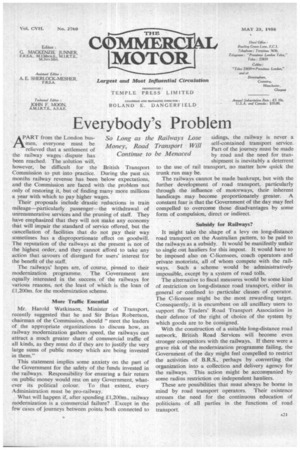Everybody's Problem • men, everyone must be PART from the London
Page 23

If you've noticed an error in this article please click here to report it so we can fix it.
bus relieved that a settlement of the railway wages dispute has been reached. The solution will, however, be difficult for the British Transport Commission to put into practice. During the past six months railway revenue has been below expectations, and the Commission are faced with the problem not only of restoring it, but of finding many more millions a year with which to pay higher wages.
Their proposals include drastic reductions in train mileage—particularly passenger—the withdrawal of unremunerative services and the pruning of staff. They have emphasized that they will not make any economy that will impair the standard of service offered, but the cancellation of facilities that do not pay their way sometimes has a disproportionate effect on goodwill. The reputation of the railways at the present is not of the highest order, and they cannot afford to take any action that savours of disregard for users' interest for the benefit of the staff.
The railways' hopes are, of course, pinned to their modernization programme. The Government are equally interested in the success of the railways for various reasons, not the least of which is the loan of I ,200m. for the modernization scheme.
More Traffic Essential Mr. Harold Watkinson, Minister of Transport, recently suggested that he and Sir Brian Robertson, chairman of the Commission, should "meet the leaders of the appropriate organizations to discuss how, as railway modernization gathers speed, the railways can attract a much greater share of commercial traffic of all kinds, as they must do if they are to justify the very large sums of public money which are being invested in them."
This statement implies some anxiety on the part of the Government for the safety of the funds invested in the railways. Responsibility for ensuring a fair return on public money would rest on any Government, whatever its political colour. To that extent, every Administration mast be pro-railway.
What will happen if, after spending f1,200m., railway modernization is a commercial failure? Except in the few eases of journeys between points both connected to sidings, the railway is never a self-contained transport service. Part of the journey must be made by road and the need for transhipment is inevitably a deterrent to the use of rail transport, no matter how quick the trunk run may be.
The railways cannot be made bankrupt, but with the further development of road transport, particularly through the influence of motorways, their inherent handicaps may become proportionately greater. A constant fear is that the Government of the day may feel compelled to overcome those disadvantages by some form of compulsion, direct or indirect.
Subsidy for Railways?
It might take the shape of a levy on long-distance road transport on the Australian pattern, to be paid to the railways as a subsidy. it would be manifestly unfair to single out hauliers for this impost. It would have to be imposed also on C-licensees, coach operators and private motorists, all of whom compete with the railways. Such a scheme would be administratively impossible, except by a system of road tolls.
The alternative to fiscal measures would be some kind of restriction on long-distance road transport, either in general or confined to particular classes of operator. The C-licensee might be the most rewarding target. Consequently, it is encumbent on all ancillary users to support the Traders' Road Transport Association in their defence of the right of choice of the system by which goods are to be consigned.
With the construction of a suitable long-distance road network, British Road Services will become even stronger competitors with the railways. If there were a grave risk of the modernization programme failing, the Government of the day might feel compelled to restrict the activities of B.R.S., perhaps by converting the organization into a collection and delivery agency for the railways. This action might be accompanied by some radius restriction on independent hauliers.
These are possibilities that must always be borne in mind by road transport operators. Their existence stresses the need for the continuous education of politicians of all parties in the functions of road transport.
























































































